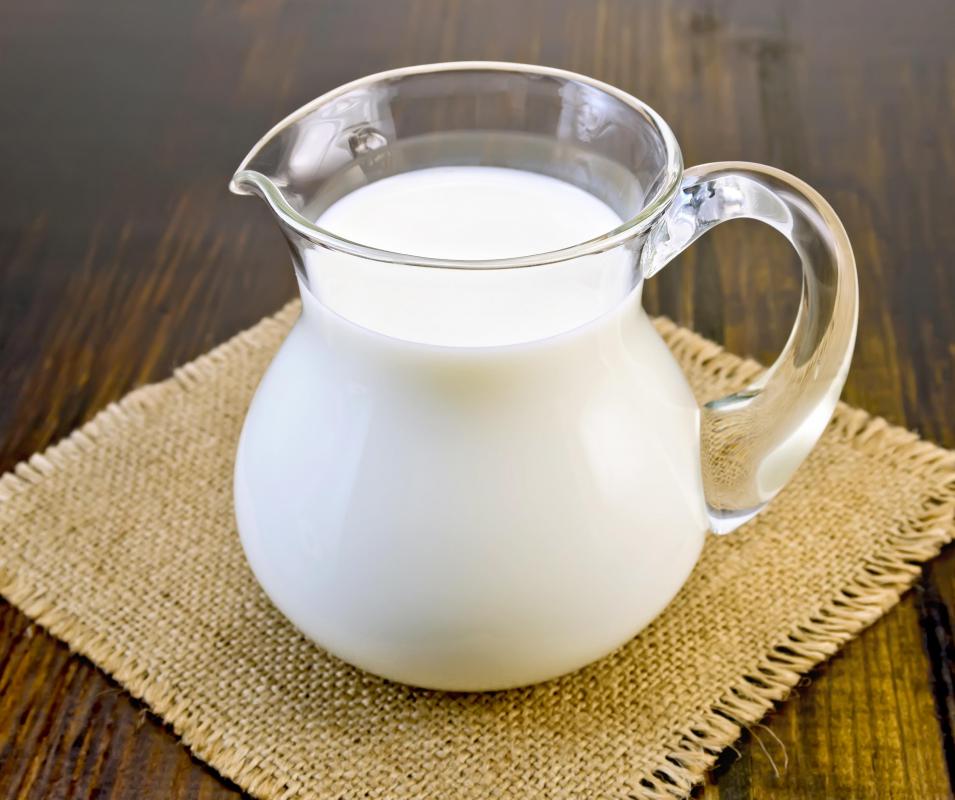At DelightedCooking, we're committed to delivering accurate, trustworthy information. Our expert-authored content is rigorously fact-checked and sourced from credible authorities. Discover how we uphold the highest standards in providing you with reliable knowledge.
What Is Almond Cheese?
Almond cheese is a cheese-like food made from ground almonds or almond milk. Commercial versions resemble cheddar or other conventional cheeses, while homemade versions tend to be softer and less processed. This food can be made suitable for people on raw or vegan diets, or those who suffer from milk and soy sensitivities, but sometimes contains casein, or milk protein, and other restricted ingredients. Almond cheese comes in a wide range of flavors, some very nutty and others quite mild.
Commercial almond cheese starts with almond milk, made from nuts ground in water, that is then strained. This substance more closely resembles dairy cheese than the homemade product, and may include milk protein, rice flour, and oil, as well as coagulating agents. Almond-based commercial cheeses melt better than soy or rice-based cheese, making them a popular choice for pizza or hot sandwiches. Like most other vegetarian cheese products, they do not perform as well as dairy cheese.

Recipes for homemade almond cheese often use soaked, ground almonds as a base, along with salty ingredients such as miso and nutritional yeast. These cheeses may be fermented, using bacteria similar to that used in yogurt-making, or the liquid from sprouted grain. Some nut cheeses don't undergo fermentation, and are simply pressed into shape.
This type of cheese offers options for those on restricted diets, but is not suitable for all. Commercial nut cheese often works for people who cannot tolerate lactose, but does not work for those with dairy protein allergies. The milk ingredients in most commercial almond cheeses also render them inappropriate for vegans, though homemade versions are usually designed to be vegan, and often contain neither soy nor wheat, making them suitable for severely restricted diets. Almond-based cheese appropriate for raw diets can be firmed up in a dehydrator, but should not be heated above 104° Fahrenheit (40° Celsius). Dehydrating fermented almond cheese often produces a rind, similar to that found on soft dairy cheese.

Commercial almond cheeses frequently mimic specific types of dairy cheese. They may include flavorings, such as garlic, jalapeno peppers, or herbs, and come in either chunks, slices, or shreds. Homemade nut cheese is often soft, and, when unfermented, it can be used as a ricotta substitute or flavored as a cheese spread alternative. Fermented almond cheese can resemble Brie, Camembert, and other soft, mild cheeses, though the end product rarely has the same smoothness.

There are also a variety of flavors that result in the different versions of almond cheese. Unfermented almond cheese usually has a pronounced nutty flavor, and should not be expected to simulate dairy cheese. Commercial almond products closely imitate dairy cheese, though their taste may seem somewhat artificial. Homemade fermented nut cheeses develop a tangy flavor, often augmented with strong spices, that covers the nut taste but does not remove it entirely.
AS FEATURED ON:
AS FEATURED ON:














Discussion Comments
I think almond cheese is the healthiest cheese out there. It's very low in fat and calories, but high in protein.
@donasmrs-- If you're looking for regular cheese texture in almond cheese, I'm afraid you won't find it. Almond cheese is never going to melt. But you can make it into cubes or crumbles, like feta cheese.
I have a very simple almond cheese recipe. It just requires putting almonds through a food processor with lemon juice until it starts to stick. You can include olive oil in it if you want, as well as seasoning. I like putting oregano and red pepper flakes in mine for flavor and color. Some people put black sesame seeds instead.
After I grind them in the processor, I wet my hands and shape them into balls, or flatten them and cut them into cubes with a knife.
I generally use almond cheese in sandwiches or on salads. It's very healthy and filling. It can take a while to get used to the flavor, but once you do, you'll love it.
I recently became vegan and I'm still trying to adjust to vegan cheeses. I tried a commercial almond cheese and I wasn't very impressed by the taste or texture. I've heard that homemade almond cheese is a lot better.
What is the best recipe for homemade almond cheese? And what type of almonds should I use? I'd appreciate any advice on this.
Post your comments